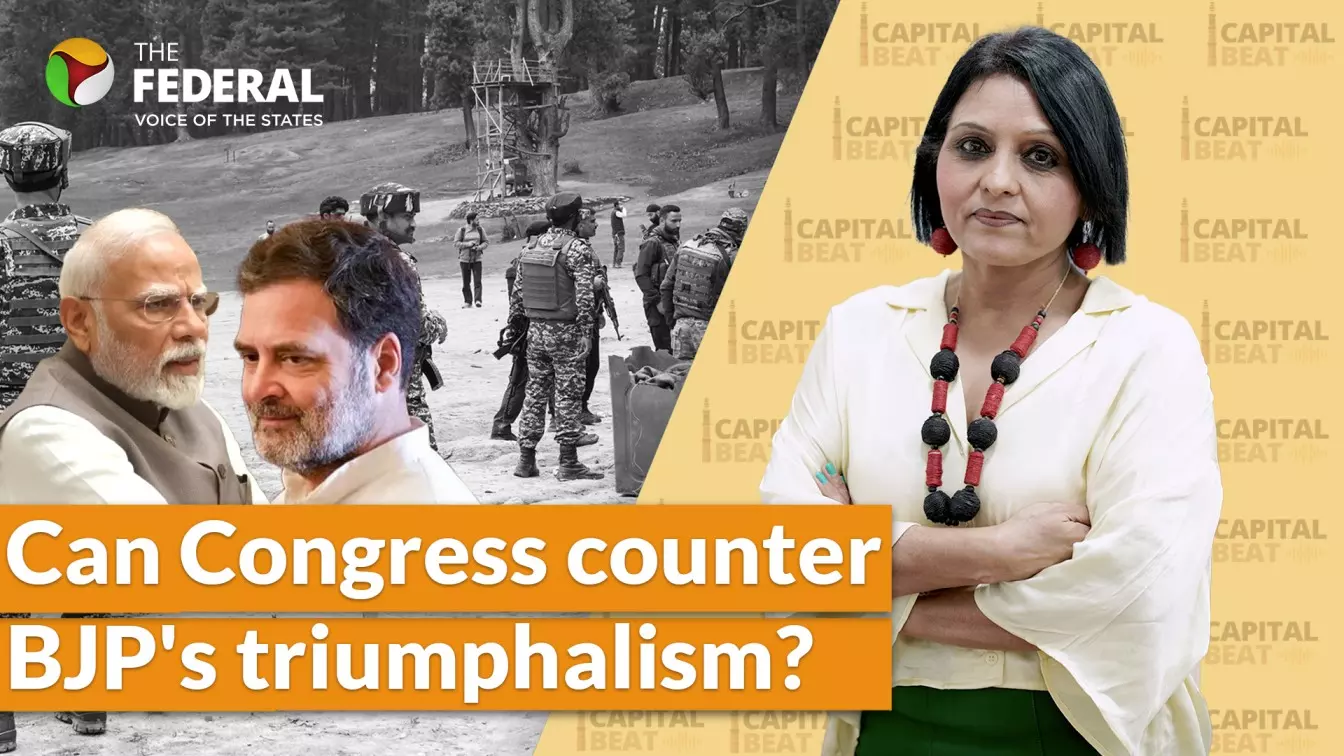
BJP vs Congress on nationalism
Operation Sindoor: Can Congress counter BJP's 'bravado'? I Discussion
After the Pahalgam attack, BJP and Congress launch rival yatras on nationalism. Can Congress blunt BJP’s post-offensive political momentum?

In this gripping episode of Capital Beat, host Neelu Vyas delves into a sharp political contest that has unfolded after the Pahalgam terror attack and Operation Sindoor. As the BJP launches its Tiranga Yatra to salute the armed forces, the Congress counters with its Jai Hind Yatra, raising tough questions about ceasefire decisions, foreign intervention, and the Modi government's national security narrative. The episode featured a robust discussion with senior journalist Vivek Deshpande, Congress’s Sanjay Jha, and The Federal’s Editor-in-Chief S Srinivasan.
Politicising patriotism
Sanjay Jha opened the conversation with a sharp critique of politicising the armed forces. He recalled the BJP's 2019 Balakot campaign and the glorification of military figures, arguing this strategy shaped public opinion through “hyper-nationalism.” “The people of India have seen a meek surrender before the United States,” Jha said, referring to US President Donald Trump’s public claim of brokering the ceasefire and the lack of official rebuttals from India.
Also read: Operation Sindoor: 'For first time India crossed a psychological threshold'
Jha also flagged controversial statements by BJP leaders, including one reportedly involving the tricolour used to wipe sweat, and another offensive comment on Colonel Sophia Qureshi. “It’s disgraceful,” he said, calling out the ideological shift in BJP’s treatment of national heroes.
Countering propaganda
Vivek Deshpande agreed the Congress was trying to counter the BJP’s “propaganda,” but noted it was not yet effective. “If we had the upper hand over Pakistan, why did we agree to a ceasefire without extracting any concessions?” he questioned, emphasising that such an outcome is unheard of in military history.
Deshpande urged the Congress to ask harder questions — especially about accountability, the terms of the ceasefire, and unverified reports regarding downed Rafale jets. “You have to take your truth to the same decibel level as BJP’s propaganda,” he stressed.
Communication conundrum
S Srinivasan argued that the Congress must break BJP’s narrative, which fuses nationalism with religious polarisation. “The real challenge is communicating these complex issues in a language the common man understands,” he observed.
He also pointed to geopolitical setbacks, including India’s diplomatic failure at the IMF and the growing military-industrial strength of China and Pakistan. According to Srinivasan, Congress must now articulate India’s isolation and diplomatic shortcomings in relatable terms to the electorate.
Failures in accountability
All the panellists agreed on the need for transparency. Jha reminded viewers of Pulwama and Pahalgam as serious lapses, asserting that the BJP has created a culture where questioning the government is equated with anti-nationalism.
Deshpande amplified this, demanding to know why the air force could neither confirm nor deny aircraft losses. “If the pilots are safe, where did the aircraft fall? In our territory or Pakistan’s?” he asked. Both he and Srinivasan felt these details, while sensitive, must be addressed in the interest of national integrity — but through civilian leadership post-conflict.
Ceasefire sans conditions?
Deshpande strongly argued that no meaningful ceasefire can occur without conditions, particularly when India appeared to be in a militarily advantageous position. “If Pakistan was begging, why didn’t we impose any terms — such as the handover of Pahalgam terrorists?” he asked.
Also read: Tharoor, Kanimozhi in govt delegation to spread Op Sindoor message abroad
Jha pointed to the lack of response from India's key allies like Russia and the West, asserting that India was diplomatically cornered. He also warned that the terror infrastructure in Pakistan remains deeply entrenched, demanding a long-term counterterrorism policy — not event-based grandstanding.
Time to shift gears
While acknowledging Congress’s frequent press briefings, all three panellists argued that the party must now shift gears. “They need to go door-to-door with these questions,” Deshpande said. Jha agreed, adding, “You need to connect with emotion, not data.” He emphasised storytelling rooted in public memory — from Pulwama to Pahalgam — to expose governance failures and reassert Congress as a credible opposition.
Srinivasan added a final note of caution: “The Congress needs strategic articulation, not just reaction. There’s opportunity in this crisis, but only if they can speak to the Indian voter in plain terms.”
The content above has been generated using a fine-tuned AI model. To ensure accuracy, quality, and editorial integrity, we employ a Human-In-The-Loop (HITL) process. While AI assists in creating the initial draft, our experienced editorial team carefully reviews, edits, and refines the content before publication. At The Federal, we combine the efficiency of AI with the expertise of human editors to deliver reliable and insightful journalism.

